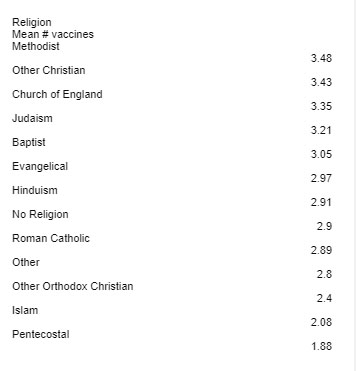• Study links certain religious beliefs to jab rates in England
• People of faith and ethnic minorities mostly more hesitant
• Results spark calls for NHS to get faith leaders on board
Some faiths are stronger than others, when it comes to trust in Covid vaccines, as research reveals believers of particular faiths have more doubts about the jab.
Church of England and Methodist followers have had significantly more COVID-19 vaccinations, while Pentecostal, Orthodox Christian, Islamic and Roman Catholic faiths have had significantly fewer.
The study, out in the journal Vaccine, comes as the NHS gears up its Spring Covid booster jab rollout for the elderly and vulnerable, between now and June. Its results suggest talking to faith leaders to shape more carefully tailored public health campaigns could increase uptake, researchers say.
“Recognising the diverse associations of different religious affiliations on health behaviour is important for shaping future vaccination campaigns and policy in interventions,” said study leader Steven Pickering, Honorary Professor at Brunel.
“Engaging with religious communities and leaders may be one method through which to deal with vaccine hesitancy and improve public health.”
Earlier research shows religious beliefs are linked to vaccine hesitancy, and this study digs into what that picture looks like in England. Political scientists at Brunel University London looked at YouGov survey data from more than 12,000 people in England, between July 2022 and March 2024.
Researchers asked whether people identified with a religion, and if so, which one, plus the number of COVID-19 vaccinations they had had. They crunched figures to allow for age, gender, education, trust in other people, trust in government, and political leaning.
General distrust in the state, rumours about whether the vaccines are medically safe and questions over whether they break religious rules are some of the reasons suggested for the trust divide.
Political views are another factor. Generally, people who trust the government and trust other people tend to get more vaccines, the research revealed. But more right-leaning people tend to get fewer.
“Some minority groups may have experienced discrimination in the past and may have generally lower levels of trust in authority figures,” said Prof Pickering. “We know, for instance, from research we just published that ethnic minorities have lower levels of trust in the NHS.
“Interestingly, we find that Pentecostal respondents have a high level of trust in medical doctors, but a low level of trust in scientists. This is something we need to do further research on.”

Vaccine hesitancy among Roman Catholics may seem puzzling since Pope Francis in 2021 publicly urged people to get vaccinated ‘as an act of love’.
Islamic scholars debated about whether the COVID-19 vaccines broke Islamic law. But in England, researchers suppose hesitancy among Muslims and other non-Christians might also be because people belonging to these faiths denominations are often ethnic minorities, and previous research shows people from ethnic minorities have high levels of distrust in vaccines.
People from ethnic minorities also have a significantly lower trust in the NHS than white people in the UK, the study says. In 2021, the Scientific Advisory Group for Emergencies (Sage) said vaccine hesitancy was highest in black or black British groups, with 72% saying they were unlikely or very unlikely to get the jab.
“Religion can play a key part in vaccine rollout, where faith leaders fight disinformation, and use mosques as vaccination centres,” Prof Pickering said. Clearly, we need more of this. Health authorities, such as the NHS, need to reach out to religious leaders to help them.”